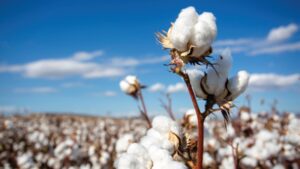BREEDING NEW STONEVILLE® COTTON VARIETIES TO GIVE GROWERS OPTIONS
‘If we don’t get better and better, we’re not doing our job,’ breeder says

Cory Mills, Ph.D
Growers love options, according to Cory Mills, Ph.D and BASF’s U.S. commercial cotton breeding lead, especially in regard to seed varieties. Having options when it comes to protecting their crops from threats like insects, disease and nematodes is critical for growers who are trying to not only protect yield, but also make a living for their families. This is where the job of a cottonseed breeder comes in. Mills leads a team of breeders whose main objective is to develop and deliver both genetically modified and native traits in varieties of Stoneville® cotton that help make farmers’ lives easier.
“We like to stair-step up the quality each time we release a new variety,” Mills said. “If we don’t get better and better, we’re not doing our job.” Over the last several years, Mills said he has seen growth in the quality and genetic gain of the varieties brought to market. Growth has also occurred in the type of product a farmer wants, offering more traits and giving more opportunity and flexibility to growers. Among several qualities that set Stoneville cotton apart from the competition, Mills believes seed quality is at the heart of its success. “Plant it in whatever environment, and it’s going to come up out of the ground,” he added.
| “WE LIKE TO STAIR-STEP UP THE QUALITY EACH TIME WE RELEASE A NEW VARIETY. IF WE DON’T GET BETTER AND BETTER, WE’RE NOT DOING OUR JOB.” – CORY MILLS |
“It stands and delivers – I know that’s a slogan, but I think the history is there to prove it.” History isn’t the only thing that gives Mills confidence in Stoneville cotton. With an anticipated  commercial availability in 2024, BASF is introducing Axant Flex™ herbicide trait technology – cotton’s first and only quad-stacked herbicide trait package. “Not only am I excited about that, but the germplasm that goes with it is our newest and best,” Mills said. “We’re able to stack a combination of native traits to combat things like leaf blight and nematodes.”
commercial availability in 2024, BASF is introducing Axant Flex™ herbicide trait technology – cotton’s first and only quad-stacked herbicide trait package. “Not only am I excited about that, but the germplasm that goes with it is our newest and best,” Mills said. “We’re able to stack a combination of native traits to combat things like leaf blight and nematodes.”
Having grown up on a farm himself, Mills is committed to the quality of this cottonseed, not only because it’s his job, but also because of what he can deliver to the grower. “As a farmer, the one thing you want to do when you invest in seed – the one thing that makes you happy – is when you see it coming out of the ground,” Mills said. “And I think the ability to do that for a farmer, that right there is a huge piece of Stoneville’s legacy.”




